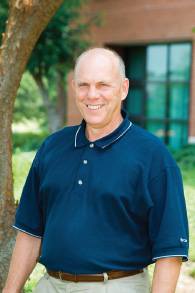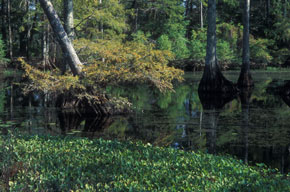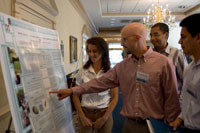Volume 2, Issue 1 Summer 2008
THE SUNFLOWER RIVER
ASSESSING THE EFFECTIVENESS OF STREAMFLOW AUGMENTATION TO MAINTAIN WATER QUALITY AND WETLAND INTEGRITY
Gary Ervin, Biological Sciences; Todd Tietjen, Wildlife and Fisheries, Mississippi State University
The Big Sunflower River is listed on Mississippi's Clean Water Act 303(d) as an impaired water body. Substantial decreases in the Sunflower River's late summer/early autumn base flows, as a result of agricultural withdrawals from the Mississippi River Valley Alluvial Aquifer, contribute to the river's impairment. A project was initiated in the Mississippi Water Resources Research Institute to provide a quantitative ecological evaluation of wetland and water quality impacts resulting from groundwater supplementation to a major stream in the Lower Mississippi Alluvial Stream.
Scientists monitored water quality and vegetation data in a small set of target wetlands and stream reaches along a longitudinal gradient from just upstream of groundwater augmentation wells to just north of Indianola, MS. Findings suggest that there are modest improvements in the overall system associated with augmented stream flow. Water quality parameters generally remained in an acceptable range during periods of flow augmentation and there were indications of improved riparian vegetation communities in reaches of the river which have received supplemental flow for years. The underlying problem of over pumping of groundwater is not addressed by flow augmentation but does provide some value in remediating these withdrawals.
The Yazoo-Mississippi Delta Joint Water Management District was a partner in this project. Findings will assist YMD personnel with an quantitative evaluation of the ecological effects of their water management efforts. The results also provides guidance for YMD staff to plan future activities effectively. Results of this research increased the efficacy with which water district managers can plan and implement programs to augment surface water flows and storage within the Lower Mississippi Alluvial Valley (LMAV) in an effort to balance societal and ecological needs.
FROM THE DIRECTOR

The Mississippi Water Resources Research Institute has been busy this spring and summer with numerous projects, including the annual conference. The conference was held April 15-16 at the Hilton-Jackson with over 100 in attendance. I hope you were able to make this year's conference, if not, I hope to see you next year.
The conference included 13 posters and 30 oral presentations. Once again, students were encouraged to enter the poster and presentation contest. Four students posters were presented with Curtis Gebhard, a Clemson University graduate student garnering the top prize. Curtis is working on projects with USGS in the Jackson, Miss. office.
Nine students made oral presentations during the conference. Jared McKee, an engineering graduate student at Mississippi State University garnered the top prize with his presentation on a water budget from the Tenn-Tom Waterway from Whitten Lock to Heflin Lock and Dam. University of Mississippi civil engineering graduate student Leili Gordji received second place for her presentation on movement and water pollutants in Sardis Lake. The third place winner was Seiji Miyazono, a Mississippi State University wildlife and fisheries graduate student. Seiji spoke on the effects of landscape factors on limnological conditions of floodplain lakes in the Yazoo River Basin. All of the students did an exemplary job and it was hard to pick three out of this excellent group of students.
We were fortunate to have plenary speakers Ed Martin of the National Oceanic and Atmospheric Administration; Charles Wax, state climatologist and professor of geosciences at Mississippi State University; and Donn Rodekohr, researcher in the department of agronomy and soils at Auburn University. A panel discussion in the closing plenary session included Chip Morgan, executive director of Delta Council; Bill Walker, executive director of the Mississippi Department of Marine Resources; Bryon Griffith, director of the Gulf of Mexico Program Office, Environmental Protection Agency; and Trudy Fisher, executive director of the Mississippi Department of Environmental Quality.
Our luncheon speakers included the honorable Brandon Presley, commission of the northern district, Mississippi Public Service Commission and Ms. Barbara Travis, executive director of the Mississippi World Trade Center.
It goes without saying that the conference would not be successful without our many sponsors. This year, the conference was sponsored by the Mississippi Department of Environmental Quality, Mississippi Public Service Commission, Mississippi Water Resources Association, National Oceanic and Atmospheric Administration, Mississippi Water Resources Research Institute, and the U.S. Geological Survey. Student prizes were funded by Clearwater Consultants, Pickering Inc., and Weyerhauser. Conference exhibitors included the Army Corps of Engineers, Mississippi World Trade Center, Pat Harrison Waterway, National Oceanic and Atmospheric Administration, National Aeronautic and Space Administration, and Yazoo-Mississippi Delta Levee Board.
The conference proceedings are now available for your review on the www.wrri.msstate.edu web site
Please check out our web site for information, news, and publications. We have recently completed the project to place all of the conference proceedings, dating back to 1966, on the web site. We are working to provide a clearinghouse of data on the site. Please visit the site often at www.wrri.msstate.edu.

FUNDED RESEARCH PROJECTS

Se-Tac
Small rural water associations throughout the southeast continue to receive funding for research and training on disinfectants, shared management, and comprehensive GIS/GPS training. For example, funding was provided to the Tennessee Association of Utility Districts to develop and conduct a series of 12 two-day performance-based course offerings at multiple locations across the state. The training was on bacteriological sampling, monitoring, and reports. The course curriculum, classroom materials, and course exercises targeted small community water treatment and distribution system operators. A total of $300,000 was funded for the 2006 - 2008 funding cycle. For further information or questions, please contact Jonathan Pote at 662-325-0868.
USGS Projects
Gregg Davidson, University of Mississippi, is reanalyzing samples taken from Hampton Lake since contamination was evident. Elevated As, Co, Cu, and Ni were all found at the same depth though Pb was not elevated within the same zone.
Gary Ervin and Todd Tietjen, Mississippi State University, continue water quality sampling. They have completed vegetation monitoring and data is currently being analyzed. A water quality sampling meeting is scheduled with YMD, the Department of Wildlife and Fisheries, and MAFES personnel. Three presentations have been made in 2008 in Tunica and Jackson.
Charles Wax, Mississippi State University, is using a prototype water use model which contains acreage, irrigation methods, and management strategies data. This information was used to predict annual water demand for cotton, rice, soybeans, corn, and catfish during the 2006 growing season in Sunflower County, Mississippi. Attempts to identify controls of aquifer recharge rates or recharge to Mississippi River stage on the west and Grenada Lake stage on the east, have not been successful. The model also needs work on calculating the non-growing season precipitation on both the east and west sides of the delta. Changes in cultural practices adopted for the various model run scenarios are not known to be practical or economically feasible. These need to be confirmed as valid possibilities before rigid recommendations are developed.
INFORMATION
USGS Proposals – RFP for 2009

The Mississippi Water Resources Research Institute is please to announce the release of the Request for Proposals. . The deadline for submitting proposals is October 31, 2008 with a project start date of March 1, 2009.
Publications and Presentations
Walker, W.G., G.R. Davidson, T. Lange, D. Wren. 2007. Accurate lacustrine and wetland sediment accumulation rates determined from 14C activity of bulk sediment fractions. Radiocarbon. 49:983-992.
Wren, D.G., G.R. Davidson, W.G. Walker, S.J. Galicki. 2008. The evolution of an oxbow lake in the Mississippi alluvial floodplain.Journal of Soil and Water Conservation 63(3):129-135.
Wren, D.G. G.R. Davidson. 2008. Practical implications of quantifying ancient sedimentation rate in lakes. Journal of Soil and Water Conservation 63(3):89A.
Charles Wax presented results of his research to the Groundwater Management Districts Association conference in Tallahassee, Fla., January 7, 2008, and the Office of Land and Water, Mississippi Department of Environmental Quality in Jackson, Miss., February 12, 2008.
Todd Tietjen presented a poster presentation of the work on water quality and floristic habitat assessments in the Coldwater River Basin at the North American Benthological Society in Salt Lake City, Utah.
Gary Ervin co-organized a symposium at the Society of Wetland Scientists International conference held in Washington, D.C., May 26-30, 2008.
Jason Bried and Gary Ervin made a presentation on "Making invasiveness count infloristic quality assessments' at the Society of Wetland Scientists in Washington, D.C., May 26-30, 2008.
Water Publication Now Available
For your information a new informational booklet titled, "Drinking Water: Understanding the Science and Policy behind a Critical Resource" is available for distribution. Developed by the National Research Council's Water Science and Technology Board (WSTB), this booklet includes information gathered over past years on drinking water issues aimed at raising more public awareness.
UPCOMING EVENTS
October 20-23, 2008. The 24th Annual International Conference on Soils, Sediments and Water, Amherst, MA. Contact: Denise Leonard, Environmental Health Sciences, N344 Morrill, University of Massachusetts, Amherst, MA 01003.
October 28-29, 2008. The Bays & Bayous Symposium will be held at the Mississippi Coast Coliseum and Convention Center in Biloxi, MS.
November 18-19, 2008. MWRRI Advisory Board meeting will be held at Thompson Hall, MSU. Information will be mailed to all Advisory Board members at a later date.
November 17-20, 2008. AWRA will hold its annual conference in New Orleans, LA.
Come Join Us in Tunica!
The Mississippi Water Resources Research Institute and the Mississippi Water Resources Association will hold a joint water conference August 5-7, 2009 in Tunica, MS. We're exciting about hosting this joint conference in which speakers and presentations will cover such topics as ports and waterways, agriculture, water quality, delta water, and many more. Several opportunities will be available for all attendees to participate in extracurricular activities such as a golf tournament, skeet shooting, and a riverboat evening cruise. More details will be distributed in the future through the www.wrri.msstate.edu web site, listserv, and mail. If you are not on the lists, please register through the web site
Mississippi Water Resources Research Institute (MWRRI)
The institute exists as both a federal and a state research unit. Established in 1964, the MWRRI is one of 54 institutes (one in each state, The District of Columbia, Guam, Puerto Rico, and the Virgin Islands) that form a national network to solve water problems of state, regional, or national significance. In 1983, the Mississippi legislature formally designated the MWRRI as a state research institute. Federal funds designated for the institute are used to consult with state water officials to develop coordinated research, technology transfer and training programs that apply academic expertise to water and related land-use problems. These various activities are funded through an annual grant from the United States Geological Survey (USGS). Mississippi state appropriations provide additional funds for cost share. The institute also assists state agencies in the development of a state water management plan, maintaining a technology transfer program, and serves as a liaison between Mississippi and federal funding agencies.
Discrimination based upon race, ethnicity, religion, gender, national origin, age, disability, or veteran's status is a violation of federal and state law and MSU policy and will not be tolerated. Discrimination based upon sexual orientation or group affiliation is a violation of MSU policy and will not be tolerated.